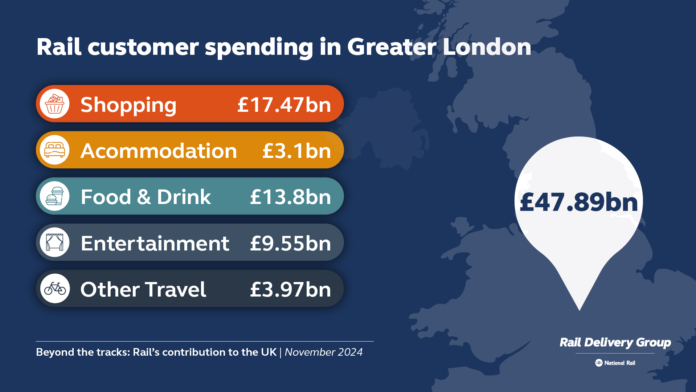New research commissioned by the Rail Delivery Group (RDG) and conducted by WPI Economics has revealed the significant economic, environmental, and social benefits that the rail industry brings to Greater London.
The study found that the rail industry contributed £11 billion to the Greater London economy in the past year, with rail customers spending an additional £48 billion in local communities. The rail network’s impact on the region’s productivity is substantial, facilitating thousands of daily journeys and supporting over 103,000 jobs across the industry.
Unlocking Future Potential
The rail industry has the potential to further drive economic growth and sustainability in Greater London. According to the Railway Industry Association (RIA), rail travel is projected to increase by an average of 1.6% annually over the next three decades. By 2035, this could lead to a 20% increase in rail usage, boosting the industry’s contribution to £15 billion in London and £35 billion nationally.
To realize this potential, the rail industry must continue to prioritise customer experience, improve services, and encourage modal shift from road to rail. By investing in infrastructure, enhancing integration with other modes of transport, and making rail more accessible, the industry can attract more passengers and contribute even more to the economy.
Supporting Net Zero Ambitions
Rail is a sustainable mode of transport, with passenger trains producing significantly fewer greenhouse gas emissions than cars. The research highlights the need for a 40% increase in rail usage by 2035 to shift four billion miles from car to train, aligning with the Committee on Climate Change’s recommended pathway to net zero. For Greater London, this would result in a reduction of 0.31 million tonnes of greenhouse gas emissions and 182 million hours of congestion.
By investing in rail infrastructure and encouraging modal shift, the rail industry can play a crucial role in achieving the UK’s net zero targets and improving air quality in cities like London.
Jacqueline Starr, CEO of Rail Delivery Group said: “The UK’s rail network does more than simply transport us from A to B; it plays a crucial role in driving economic growth by connecting businesses and communities, improving productivity, and supporting the transition to net zero.
“The creation of Great British Railways is an opportunity for the rail industry to come together and make the improvements that are needed to attract more people to rail, unlocking even greater value for the economy, environment, and wider society.
“Rail can and must be the backbone of the country’s future growth and environmental ambitions.”
A spokesperson for UKHospitality said: “This insightful report reinforces what we know about the importance of train travel for hospitality and tourism. Trains help bring our customers – domestic and international and our employees to our doors, so we can deliver great experiences and boost economic growth.
“We are looking forward to working with the rail industry to further grow the opportunities to reach all parts of our nation and spread the benefits of the hospitality sector.”





